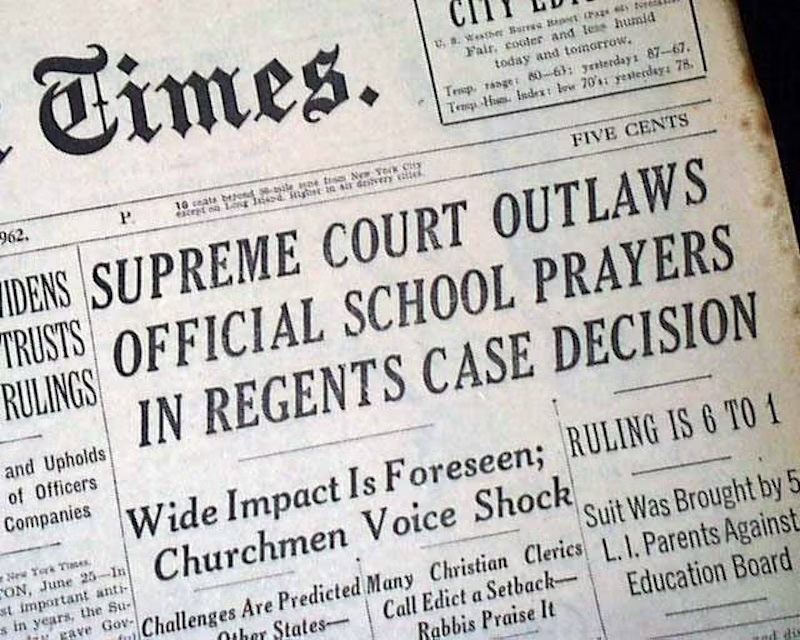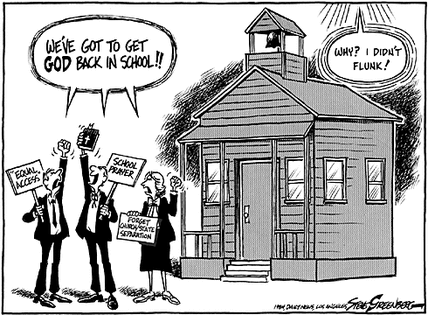Engel v. Vitale (1962)
The United States Supreme Court
Introduction
Engel v. Vitale was not a simple case, based solely on separation of church and state. Through the power of judicial review, the Supreme Court had to distinguish how far the government was allowed to interfere with the beliefs and opinions of others. The Constitution, as president Woodrow Wilson once quoted, "was not made to fit us like a strait jacket. In its elasticity lies its chief greatness." That same elasticity is what the Supreme Court analyzes while deciding the verdict for Engel v. Vitale
Background
The case started with the New York School Board of Regents passing a piece of legislation that "authorized a short, voluntary prayer for recitation at the start of each school day" ("Engel v. Vitale" [Oyez]). The prayer was conducted immediately after the Pledge of Allegiance and, because it was voluntary, "the law allowed students to absent themselves from this activity if they found it objectionable" ("Facts and Case Summary").
The prayer read: "Almighty God, we acknowledge our dependence on Thee, and beg Thy blessings upon us, our teachers, and our country" ("Engel v. Vitale" [Khan Academy]) |

Some parents did not approve of this legislation. Stephen Engel, the father of Michael Engel (a student at one of the schools that enacted the prayer), visited his son's school in Hyde Park, New York and saw his sone participating in the prayer. Being a Jew, Engel was upset to see this being enacted in public schools, kids clasping their hands and bowing their heads in prayer. After explaining to his son that that was not the way they say prayers ("Religion in Public Schools") and several other parents grouped together to protest the new voluntary morning prayer in the public schools. Once they saw protest was not the answer, Stephen Engel led the group of parents to sue school board president William Vitale.
Case Details
- April 3, 1962 ~ June 25, 1962
Amendments in question:
Establishment Clause of the First Amendment
"Congress shall make no law respecting an establishment of religion, or protecting the free excercise thereof" ("The Bill of Rights)
14th Amendment
"No State shall make or enforce any law which shall abridge the privileges or immunities of citizens of the United States; nor shall any State deprive any person of life, liberty, or property, without due process of law; nor deny to any person within its jurisdiction the equal protection of the laws” (“Constitution of the United States”)
Defense's argument (Regent School Board):
- Since the prayer was voluntary, the prayer was not in violation of the 1st Amendment.
Litigant's argument (Engel and parents):
- This legislation created by the school board violated the Establishment Clause of the First Amendment, "which was applied to the states through the 14th Amendment" (Darko).
Concluding Verdict
In a majority rule of 6-1, litigants Engel and parents won the case over the unconstitutionalism of voluntary prayer in public facilities.
| Opinions of the Supreme Court | |
| Majority Opinion (written by Justic Black) | “school-sponsored prayer violates the Establishment Clause of the First Amendment… [and] the provision allowing students to absent themselves from this activity did not make the law constitutional because the purpose of the First Amendment was to prevent government interference with religion” (“Facts and Case Summary”).
|
| Concurring Opinion (written by Justic Douglas) | “any type of public promotion of religion, including giving financial aid to religious schools, violates the Establishment Clause” (“Facts and Case Summary”). |
| Dissenting Opinion (written by Justic Stewart) | “the Establishment Clause was only meant to prohibit the establishment of a state-sponsored church, such as the Church of England, and not prohibit all types of government involvement with religion” (“Facts and Case Summary”). |

Implications and Impact
- Engel v. Vitale has been deemed as one of the most unpopular court cases in United States history because it was viewed as an attack on religion (especially Christianity)
- July 9, 1962: "NEWSWEEK reported a 'swell of indignation, astonishment, and bewilderment that swept across the nation' following the ...decision" (Wex Definitions Team)
- “Fifteen states refused to discontinue prayer and Bible reading in their schools” (Wex Definitions Team)
- “A Gallup poll taken soon after the decision revealed seventy-nine percent of Americans disapproved of the ruling” (Wex Definitions Team)


Engel v. Vitale further defined and outlined the continous struggle between church and state. On one hand, religion itself is one of the main principles that define America. The United States is well known for its religious freedom, and therefore many believe the government should have no interference with it. As this court case also highlights though, in order to protect the religious rights of others, the government must be somewhat involved to protect everyone's right toa free practice of religion.
Through Engel v. Vitale, since America holds a wide variety of religions and beliefs amongst the people, the government has no right to endorse, interfere, or prohibit any religion.
Fun Fact: A common argument against the ruling in Engel v. Vitale is that “America's Framers did not intend for a complete and total separation of church and state, as seems to be the prevailing norm in today's society” (Lewis). |
This case solidifies that the government, no matter the level of government, has to preserve total seperation of church and state and therefore must not allow for any one religion to be quintessential part of a public institution. This allows the government to therefore not violate the Establishment Clause in the First Amendment, as the government is not endorsing any particular religion.